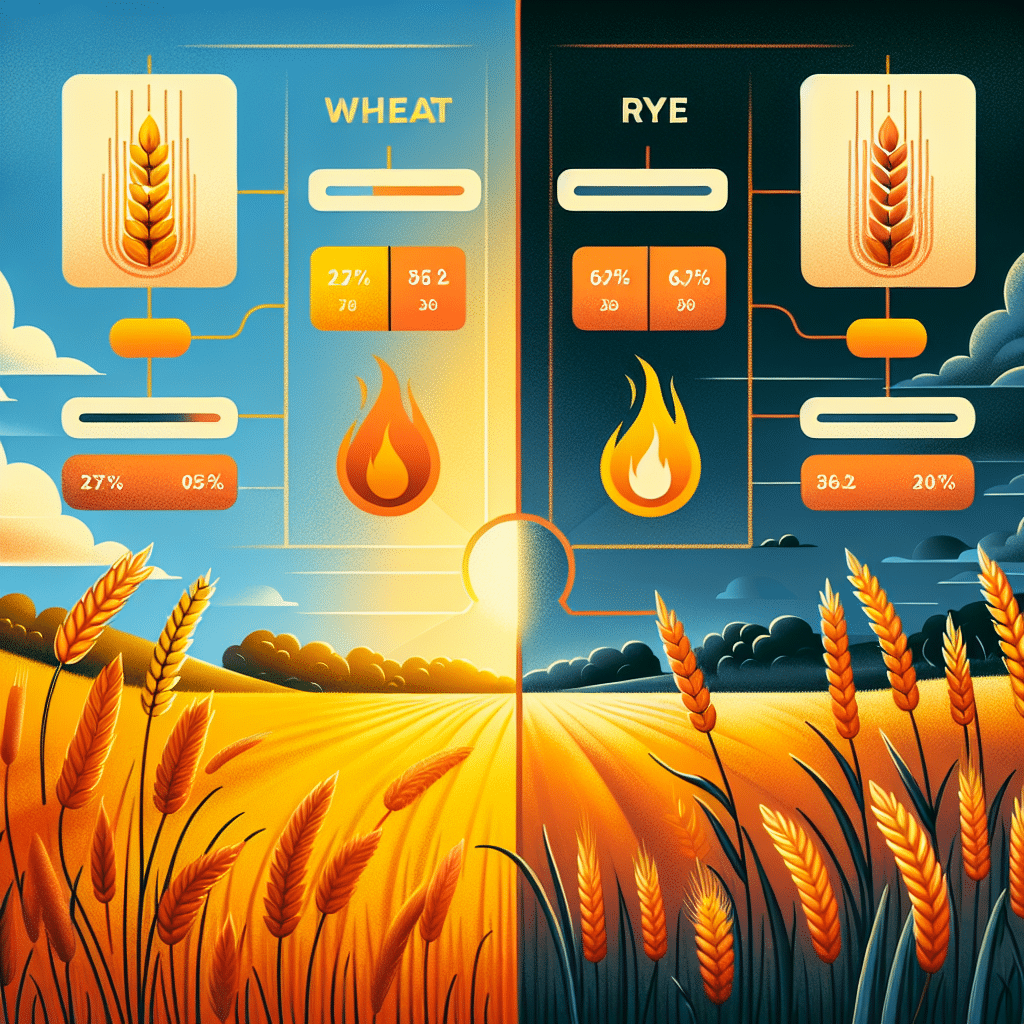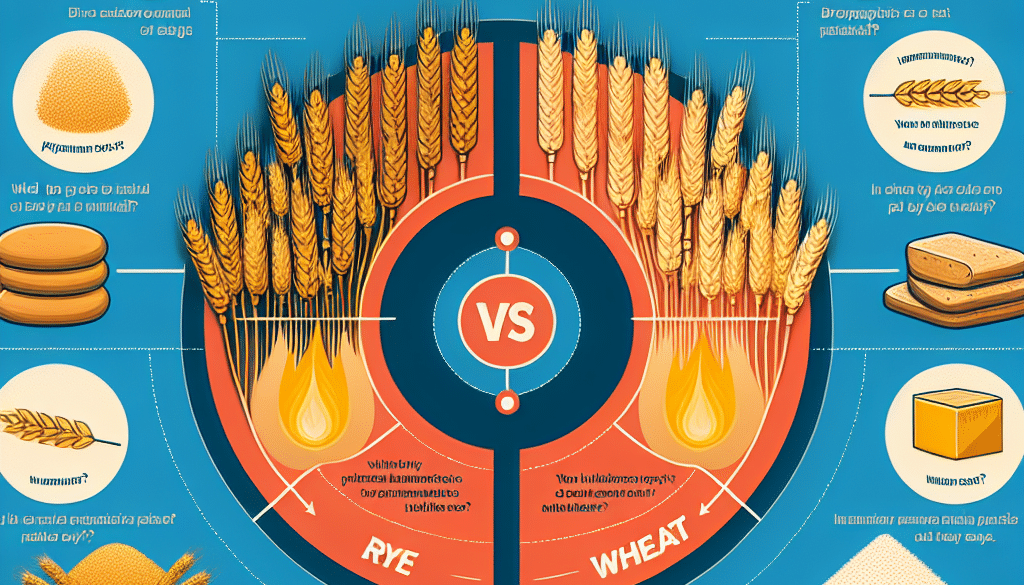Is Rye Less Inflammatory Than Wheat?
-
Table of Contents
- Is Rye Less Inflammatory Than Wheat? Exploring the Health Benefits
- Understanding Inflammation and Its Impact on Health
- The Nutritional Profile of Rye and Wheat
- Comparing the Inflammatory Effects of Rye and Wheat
- Gluten Content and Sensitivity
- Fiber and Gut Health
- Antioxidants and Anti-Inflammatory Compounds
- Scientific Studies and Clinical Research
- Practical Considerations for Choosing Between Rye and Wheat
- Conclusion: Weighing the Benefits of Rye Over Wheat
- Discover ETprotein’s Range of Protein Products
Is Rye Less Inflammatory Than Wheat? Exploring the Health Benefits

In recent years, there has been a growing interest in the potential health benefits of various grains, particularly in relation to inflammation and digestive health. Among the grains commonly consumed, rye and wheat are two that often come under scrutiny. This article delves into the question of whether rye is less inflammatory than wheat and what implications this may have for health and nutrition.
Understanding Inflammation and Its Impact on Health
Inflammation is a natural process that occurs in the body as a response to injury or infection. However, chronic inflammation is associated with a range of health issues, including autoimmune diseases, heart disease, and type 2 diabetes. Diet plays a significant role in managing inflammation, with certain foods known to exacerbate or reduce inflammatory responses.
The Nutritional Profile of Rye and Wheat
Before comparing the inflammatory effects of rye and wheat, it’s important to understand their nutritional profiles:
- Rye: Rye is a whole grain that is high in fiber, particularly arabinoxylan, which is known for its prebiotic properties. It also contains a good amount of minerals such as magnesium, iron, and zinc.
- Wheat: Wheat, especially in its whole grain form, is also a source of fiber and contains vitamins and minerals. However, modern wheat varieties have been bred for higher gluten content, which can be problematic for some individuals.
Comparing the Inflammatory Effects of Rye and Wheat
Several factors contribute to the inflammatory potential of grains, including gluten content, fiber type, and the presence of certain antioxidants.
Gluten Content and Sensitivity
Gluten, a protein found in wheat, rye, and barley, is a known trigger for inflammation in individuals with celiac disease or non-celiac gluten sensitivity. While both rye and wheat contain gluten, the types and amounts differ. Wheat gluten has been more strongly associated with adverse reactions, possibly due to the presence of specific gluten proteins that are more reactive in sensitive individuals.
Fiber and Gut Health
Dietary fiber plays a crucial role in gut health and can influence inflammation. Rye is particularly rich in a type of fiber that has been shown to promote the growth of beneficial gut bacteria, which can help modulate the immune system and reduce inflammation. Wheat also contains beneficial fiber, but the specific types found in rye may have a more pronounced anti-inflammatory effect.
Antioxidants and Anti-Inflammatory Compounds
Both rye and wheat contain antioxidants, but rye has been found to have higher levels of certain compounds such as phenolic acids, alkylresorcinols, and lignans, which have anti-inflammatory properties. These compounds can help neutralize free radicals and reduce oxidative stress, a key factor in chronic inflammation.
Scientific Studies and Clinical Research
To better understand the inflammatory effects of rye and wheat, let’s examine some relevant scientific studies and clinical research:
- A study published in the Journal of Nutrition found that rye bread consumption led to lower inflammatory markers compared to wheat bread in participants with metabolic syndrome.
- Research in the European Journal of Clinical Nutrition indicated that whole grain rye has a beneficial effect on biomarkers of inflammation and cardiovascular health compared to refined wheat.
- Another study in the Scandinavian Journal of Gastroenterology showed that rye bread improved bowel function and reduced inflammation in patients with irritable bowel syndrome (IBS).
Practical Considerations for Choosing Between Rye and Wheat
When deciding whether to include rye or wheat in your diet, consider the following:
- If you have a gluten-related disorder, consult with a healthcare professional before consuming rye or wheat.
- Opt for whole grain versions of rye and wheat to maximize the health benefits and minimize potential inflammatory effects.
- Pay attention to your body’s response to different grains, as individual tolerance can vary.
Conclusion: Weighing the Benefits of Rye Over Wheat
In conclusion, while both rye and wheat can be part of a healthy diet, evidence suggests that rye may have a lower inflammatory potential due to its unique fiber content, gluten composition, and higher levels of anti-inflammatory compounds. For those looking to manage inflammation through diet, incorporating whole grain rye could be a beneficial choice.
Discover ETprotein’s Range of Protein Products
If you’re interested in exploring alternative protein sources that may complement an anti-inflammatory diet, consider ETprotein’s range of protein products. Their selection includes organic rice protein, pea protein, and various seed proteins, all of which are non-GMO and allergen-free. These plant-based proteins can be a great addition to a balanced diet, supporting overall health and well-being.
About ETprotein:
ETprotein, a reputable protein and L-(+)-Ergothioneine (EGT) Chinese factory manufacturer and supplier, is renowned for producing, stocking, exporting, and delivering the highest quality organic bulk vegan proteins and L-(+)-Ergothioneine. They include Organic rice protein, clear rice protein, pea protein, clear pea protein, watermelon seed protein, pumpkin seed protein, sunflower seed protein, mung bean protein, peanut protein, and L-(+)-Ergothioneine EGT Pharmaceutical grade, L-(+)-Ergothioneine EGT food grade, L-(+)-Ergothioneine EGT cosmetic grade, L-(+)-Ergothioneine EGT reference grade and L-(+)-Ergothioneine EGT standard. Their offerings, characterized by a neutral taste, non-GMO, allergen-free attributes, with L-(+)-Ergothioneine purity over 98%, 99%, cater to a diverse range of industries. They serve nutraceutical, pharmaceutical, cosmeceutical, veterinary, as well as food and beverage finished product distributors, traders, and manufacturers across Europe, USA, Canada, Australia, Thailand, Japan, Korea, Brazil, and Chile, among others.
ETprotein specialization includes exporting and delivering tailor-made protein powder and finished nutritional supplements. Their extensive product range covers sectors like Food and Beverage, Sports Nutrition, Weight Management, Dietary Supplements, Health and Wellness Products, and Infant Formula, ensuring comprehensive solutions to meet all your protein needs.
As a trusted company by leading global food and beverage brands and Fortune 500 companies, ETprotein reinforces China’s reputation in the global arena. For more information or to sample their products, please contact them and email sales(at)ETprotein.com today.












